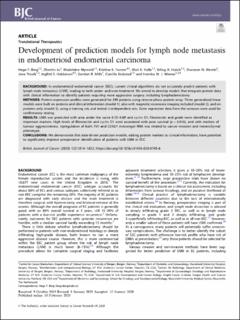Development of prediction models for lymph node metastasis in endometrioid endometrial carcinoma
Berg, Hege Fredriksen; Ju, Zhenlin; Myrvold, Madeleine; Fasmer, Kristine Eldevik; Halle, Mari Kyllesø; Høivik, Erling Andre; Westin, Shannon; Trovik, Jone; Haldorsen, Ingfrid S.; Mills, Gordon B.; Krakstad, Camilla; Werner, Henrica Maria Johanna
Journal article, Peer reviewed
Published version

Åpne
Permanent lenke
https://hdl.handle.net/11250/2739770Utgivelsesdato
2020-02-10Metadata
Vis full innførselSamlinger
- Department of Clinical Science [2318]
- Registrations from Cristin [9791]
Sammendrag
Background
In endometrioid endometrial cancer (EEC), current clinical algorithms do not accurately predict patients with lymph node metastasis (LNM), leading to both under- and over-treatment. We aimed to develop models that integrate protein data with clinical information to identify patients requiring more aggressive surgery, including lymphadenectomy.
Methods
Protein expression profiles were generated for 399 patients using reverse-phase protein array. Three generalised linear models were built on proteins and clinical information (model 1), also with magnetic resonance imaging included (model 2), and on proteins only (model 3), using a training set, and tested in independent sets. Gene expression data from the tumours were used for confirmatory testing.
Results
LNM was predicted with area under the curve 0.72–0.89 and cyclin D1; fibronectin and grade were identified as important markers. High levels of fibronectin and cyclin D1 were associated with poor survival (p = 0.018), and with markers of tumour aggressiveness. Upregulation of both FN1 and CCND1 messenger RNA was related to cancer invasion and mesenchymal phenotype.
Conclusions
We demonstrate that data-driven prediction models, adding protein markers to clinical information, have potential to significantly improve preoperative identification of patients with LNM in EEC.
